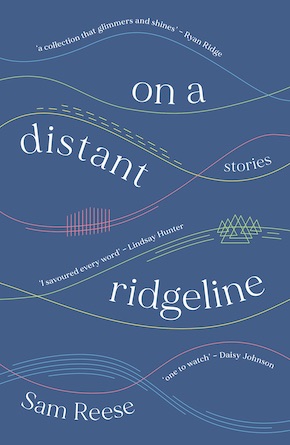Magpies
by Sam Reese
“An ardent observer of the understated, Reese’s expansive stories amplify life’s quiet moments in crisp, clear prose.” Ryan Ridge
The girl tenses when her mother calls her name like that. She clings to the racks; sleeves brushing against her cheek. She crosses the store. Normally, her mother doesn’t like to be overt; only gentle movements when she’s found what she wants. Sometimes the girl won’t even notice. Today, though, she is loud. She is trying to be obvious. The girl tucks in her chin.
Isn’t this brooch pretty? her mother exclaims. One of the assistants looks up from attending to a grumpy man, beaming as the mother shows her daughter the ornate gold brooch, a cameo design. Her eyes crinkle; suddenly the man is not so terrible.
With a clamp, the girl feels cold – the metal fastening against her neck, around her ponytail, then its pressure on her back, a sprint as her legs are pushed, propelled, out of the warm store, beyond the black dress she’d liked, out into the street.
They take two corners before they stop, panting in the cold, but it’s not the air that has set the hairs on angles down her neck. The girl isn’t laughing like the woman squeezing her hand is. But she forces a smile and pats her mother’s arm.
She dreads those days her mother tells her that she’s looking pretty. Your skin is so nice today; let’s make sure you’re elegant as well. At school, her friends like to complain. They compare the endless ways their parents suck. They wish their mothers would buy them this or that, just spend an hour hanging out sometime.
The girl wishes she could make the hours disappear – the hours of dressing up, getting her look just right. Her skin starts to shiver – like something is growing underneath – the moment that her mother talks about an outing to the shops.
She does not want fancy clothes. She wants to blend in.
Worse are days like this: when everything looks fine; when she’s wearing something normal, when she wanders on her own, enjoying being bored – because these days never last. Slowly she’ll forget, her thoughts will wander, then she’ll feel something slipped against her skin, something nestled in her pocket, and she knows that in a moment she will have to run.
Sometimes she worries that she is becoming a gatherer, too. Because she knows it’s like hunger, like a thirst. That’s what she believes: it’s a bodily desire her mother cannot control.”
At night, she remembers all the owners of the shops. She imagines kind old men looking for a watch they think a customer will like, so sure it had been just there. She can see their faces falling into worry, consternation, sometimes even pain. She feels their winces, her gut twisting for the shop assistants who stoop down to talk to her, to help her try on a belt, a pair of buckled shoes, while her mother whips an item – sometimes just a greeting card, a packet of gum – into that green handbag.
She wants to know if these men and women go home and talk to their parents about the things that have gone missing; if they lie awake too. If they need to stop and make themselves a cup of tea before meeting up with friends. She often makes her mother tea, measuring the honey, making sure to stir it twice in one direction, once the other way. Sometimes she worries that she is becoming a gatherer, too.
Because she knows it’s like hunger, like a thirst. That’s what she believes: it’s a bodily desire her mother cannot control. Lately, her friends have begun to talk about their food like it’s a choice. What will I eat today? Should I touch my lunch?
Will this sandwich make me fat? The girl knows already that her yearning doesn’t work like that. Gatherers are not like other people. They don’t look at things the same way.
She had heard of magpies long before she found her mother’s hoard. They had even studied pictures of the bird together. So, she understood that the ugly, heavy crows that they called magpies round there, in their patchy black and white, were not the same thing as the magpies you found overseas. Those were dainty, elegant, like her mother when she practiced her old dances. Their tails fanned in blue and green, like her mother’s dress as they hurtled down the street.
But she never really knew what gathering meant until that long unopened drawer in her mother’s room at last cascaded out, slipping from its track and spilling gold and plastic, polystyrene, silk, all across the bedroom, over her now winded body, over her spreadeagled limbs. She saw it in the way her mother leapt across her in one bound, scooping trinkets to her chest, squeezing them with care.
Of course, her mother gave a different explanation the next day, the way she always did. Between pecks at her granola and long sips of herbal tea, she laid out in smooth succession all the problems with the system, all the reasons that resistance like their own was overdue. The girl likes the way her mother’s brilliance illuminates her face. But afterwards, her traitorous heart cannot help but wonder how this system that her mother talks about as if it was a single being matches up to all the faces she remembers in her dreams.
After midnight, she starts making complicated plans, from causing a calamity amongst the hats to long, fabricated stories she can spin for the assistant, stories about clumsiness or objects falling into unsuspecting bags. Her teacher has often shared her fear that the government is tracking all of their lives, so the girl is most concerned that the store will have her photo in the window with the branding: WANTED – THIEF.
Her friends tell her that she doesn’t need to watch her weight when she pockets her lunch money, saying that she’s full. She does not dare to tell them how she counts her mound of coins each night before she sleeps. She’s settled on honesty, paying for this thing at least – swallowing the vertigo, the sharp falling away, that comes whenever she starts to think of the other pieces that still remain in the drawer.
From the light the door lets through, she can see her mother curled on one side of the bed. It isn’t sadness when she sees the brooch between her palms, not a need for something more. Later, though, she will remember how it felt to lift her mother’s arm, gently so as not to break her grip, how it felt to gather that wing over her own chest, scooping like a treasure, like something to keep safe.
From the collection On a Distant Ridgeline (Platypus Press, £10.50)
First published (as ‘Gatherers’) in Here Comes Everyone
 Sam Reese is an award-winning writer, critic, and teacher hailing from Aotearoa. Currently a lecturer in creative writing at York St John University, he is the author of the short story collection Come the Tide (Platypus Press, 2019) and non-fiction books on jazz, literature and loneliness, (Blue Notes – LSU Press, 2019), American short fiction, and Cold War politics. On a Distant Ridgeline is out now in paperback from Platypus Press.
Sam Reese is an award-winning writer, critic, and teacher hailing from Aotearoa. Currently a lecturer in creative writing at York St John University, he is the author of the short story collection Come the Tide (Platypus Press, 2019) and non-fiction books on jazz, literature and loneliness, (Blue Notes – LSU Press, 2019), American short fiction, and Cold War politics. On a Distant Ridgeline is out now in paperback from Platypus Press.
Read more
svhreese.com
@Svhreese


